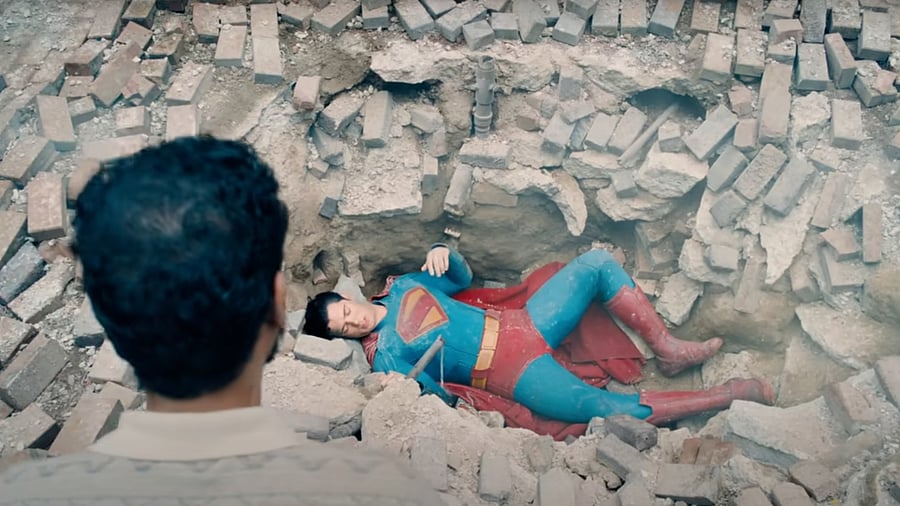
A screengrab from the trailer
Credit: YouTube/DC
By Jason Bailey
James Gunn’s much-discussed reboot of Superman is a hit, rustling up $125 million domestically and another $95 million from 79 international markets, but the coverage of its success isn’t merely that of a blockbuster. Superman’ Saves the Day for DC Studios, announced the Hollywood Reporter, while a New York Times headline noted, “With $217 Million in Ticket Sales, ‘Superman’ Helps Save Warner Bros., Too.”
In a high-profile relaunch with such oversized stakes, it’s tempting to latch on to a Superman saves the day narrative. Perhaps, in light of these record-breaking returns, not only Warner Bros. Discovery and DC but the comic book movie itself has been brought back from the precipice of death. Hollywood executives would be wise to temper their excitement about the subgenre, though, because the truth is a bit more complicated.
As both the writer-director of Superman and the co-chair of DC Studios (alongside Peter Safran), Gunn faced a dual challenge: to deliver a successful film on its own merits and to launch a hard reset of DC’s struggling movie brand.
Its characters were widely beloved and frequently featured in successful films (such as Richard Donner’s 1978 Superman, Tim Burton’s 1989 Batman, and Christopher Nolan’s Dark Knight trilogy), mostly in the days before the dominance of the Marvel Cinematic Universe. But the company’s attempts to chase the success of the MCU and build an interconnected cinematic universe of their own resulted in pictures of wildly varying quality and tone. And 2017’s Justice League, which should have been the brand’s culmination (its Avengers, if you will), was instead one of the most protracted and calamitous productions in all of superhero cinema.
The aftertaste of that DC Universe made rescuing the brand a tall order for Gunn — challenging enough on its own, but even more so as superhero cinema has boasted fewer and fewer unqualified successes in recent years. Even the seemingly indestructible Marvel has taken some hits, with high-profile disappointments such as The Marvels and Thunderbolts suffering from lowered star power and dilution of the brand by its steady stream of (mostly subpar) streaming television properties.
So, the most generous reading of Superman’s stellar opening weekend is that both Superman fatigue and superhero fatigue have been greatly exaggerated — something executives, in a state of panic over the diminishing returns for these sure things, would certainly love to believe. (And the trade publications, which increasingly exist to tell studios what they want to hear, are happy to say it.)
But what’s important to understand about superhero movies in particular, and blockbusters in general, is that people won’t buy a ticket to just anything in 2025 simply because it’s about a superhero. That may have been the case in the 2000s and 2010s, when a second-string character such as Iron Man could launch and anchor the Marvel Cinematic Universe. Lesser-known characters (to moviegoers who hadn’t read comic books, at least), including Black Widow, Ant-Man and the Guardians of the Galaxy, could also coexist alongside established figures such as the Hulk and Captain America.
That’s no longer true, which may be the simplest explanation for the decline in the dominance of the superhero movie. As studios cycled through the best-known roles, and the actors most identified with them finished out their multi-picture contracts, executives gave the green light to projects showcasing second- and even third-tier characters. That’s how we ended up with Marvel’s Eternals and Thunderbolts, DC’s Blue Beetle and Black Adam, and Sony’s Morbius, Madame Webb and Kraven the Hunter (desperate attempts to spin off Spider-Man characters into Spider-Man-free movies). Audiences ended up rejecting them.
However, the biggest film successes have been those with the best-known characters, such as Superman and the last comic book movie to open with over $100 million (a full year ago), Deadpool & Wolverine. Ticket buyers’ preference for the overly familiar presents Gunn with a bit of a pickle. In the London Times interview that sparked a right-wing backlash — after he described the film as a commentary on the country’s struggles with empathy and immigration — he said something else that was profound. Gunn promised a departure from the most overdone tropes: “I don’t need to see pearls in a back alley when Batman’s parents are killed. I don’t need to see the radioactive spider biting Spider-Man. And I don’t need to see baby Kal coming from Krypton in a little baby rocket.”
The challenge for him, and for superhero movies going forward, is to give audiences the characters and stories they want, without descending into endless recycling and repetition. It’s a tough balance to achieve, particularly when Warner Bros itself is in such a perpetually precarious financial state. And one imagines Gunn (and the studio) will need to carefully weigh the advantages of consumer familiarity with the risks of artistic expansion.
And, if that fails, at the very least, they should resist the temptation of making a Krypto spin-off.